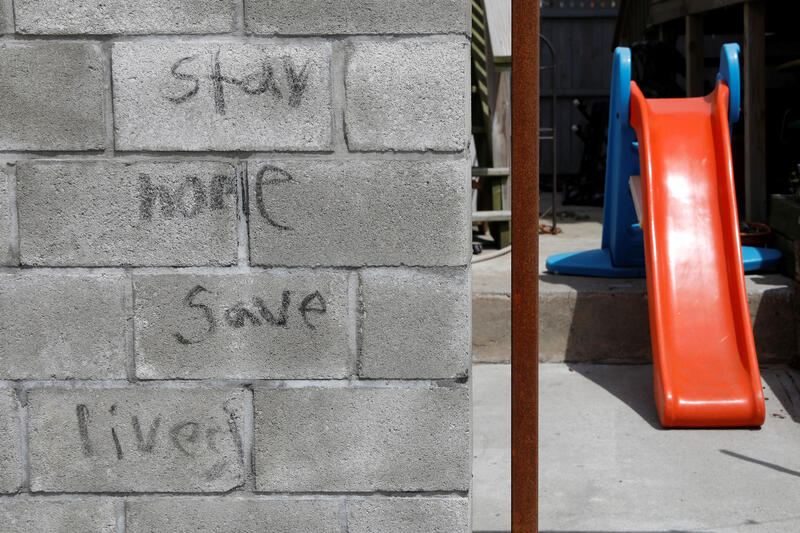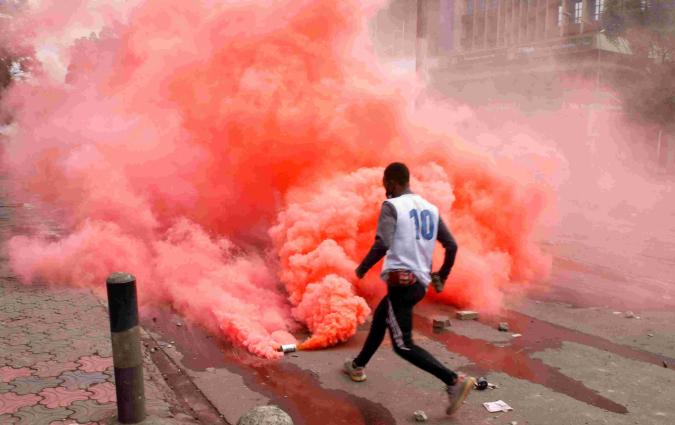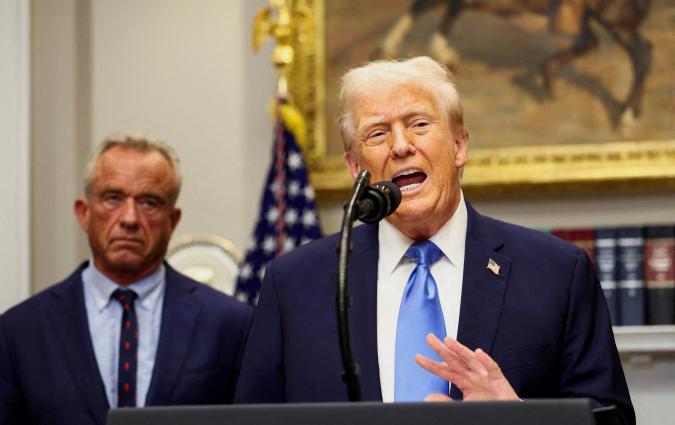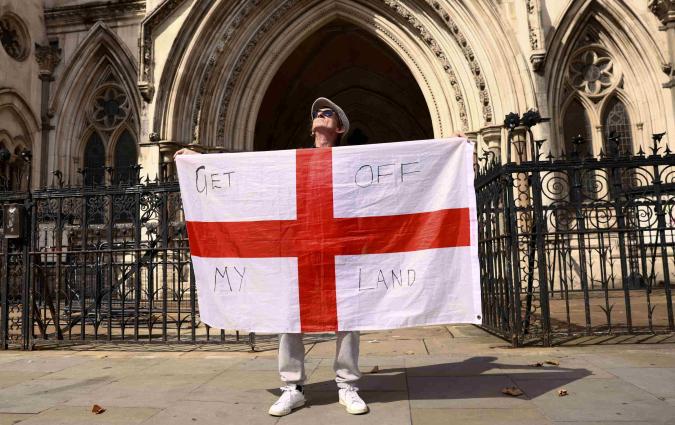“We shouldn't address this communication emergency without also relying on communications research expertise”

A message on a wall reading "Stay home save lives" is seen, during the outbreak of the coronavirus disease (COVID-19), in the Rockaway section of Queens in New York City, U.S., May 20, 2020. REUTERS/Brendan McDermid
This is an edited transcript of opening remarks by Reuters Institute Director, and Professor of Political Communication at the University of Oxford, Rasmus Nielsen on the "COVID-19 and Communication Scholarship" panel at the 70th International Communication Association Conference, May 2020. The panel was chaired by Claes H. de Vreese, Professor of Political Communication at the University of Amsterdam.
The other participants were: Hye-Jin Paek from the Department of Advertising and Public Relations at Hanyang University; Julia van Weert, Professor of Health Communication at the University of Amsterdam; Dietram A Scheufele, Taylor-Bascom Chair in Science Communication and Vilas Distinguished Achievement Professor at the University of Wisconsin-Madison; and Leticia Bode, Associate Professor at Georgetown University.
The Reuters Institute’s research as part of the field of communications and as part of understanding the coronavirus crisis
One way to describe the overall research vision at the Reuters Institute for the Study of Journalism is that we ask ourselves the question of "What does it mean that there is journalism in the world and what are the consequences of that?" Both at the level of individual attitudes and behaviour but also at the level of institutions and how those institutions - whether in politics or technology or in the media - interact with one another in different countries around the world. So the way in which we try to pursue that overarching mission in this particular crisis around coronavirus is to try to understand better using a range of different methods and running our research in a range of different countries across the world.
First of all, of course, [we look at] the role of news media and journalism in shaping public perception of coronavirus and government responses to the crisis and their level of knowledge about the disease. Secondly, [we] try to understand how this interacts with the role of different digital media platforms, whether social media, search engines, video sharing sites and messaging applications that we all know are, in part, platforms for misinformation, but also used as sources of other kinds of information, interaction and indeed comfort for many people and of course collaborative governance in many parts of the world to offer authoritative information about the disease.
Then we look specifically at different types of misinformation working on the basis of data collected by independent fact-checkers to identify what are the different types, motivations and actors that are spreading misinformation particularly via social media but also elsewhere. Across all this work, in line with the general way in which we try to do our work, we try to be attentive both to individual factors which may influence the outcomes here: things like education, for example, or political persuasion or other factors that we have a half-century or more of communication research suggesting the impact, the influence of, exposure to different kinds of information, for example, but also to think about essentially a comparative institutionalist question of how this plays out in different contexts.
We cannot assume that findings from the United States, or for that matter the United Kingdom, however important in that context, are necessarily going to be replicated elsewhere. So [at the Reuters Institute] we try to do most of this work in a rigorous, comparative fashion.
The coronavirus crisis is also a communications emergency
The American Centers for Disease Control Epidemic Intelligence Service has, I think rightly, said that a pandemic is a communications emergency as much as it is a medical crisis. And if we accept that description, which I think is a good description, then I think we can also say that we as communication researchers don't have the insight, let alone the mandate, to tell people, or for that matter politicians, exactly what they must do, but we can help inform their decision making so they have a better understanding of the likely consequences of different forces of action.
People should make the decisions. Politicians should make the decisions but we can offer empirically-based and theoretically grounded insight into what the possible consequences of those actions are. And the same way that the majority of sentient beings on this planet, but unfortunately not all of them, believe that we shouldn't address the medical crisis without at least, in part, relying on medical research expertise, I would hope that there would also be an appreciation that we should not address the communications emergency without at least, in part, also relying on communications research expertise.
The distinct contribution of communications scholarship
Communications scholars [have] domain expertise and work in institutions that protect their autonomy so that they are not people who have things to sell the way that consultants might have. And they unlike, say [colleagues] from neighbouring fields whether economics or law or many other fields, for whom I have great respect, [communications scholars] have actual domain expertise in communications, rather than just porting things they know about something else to this particular side of the crisis. Not because it's the only side of the crisis that matters but because it's one of the sides of the crisis that matters, one I think is as important that we to try to understand on the basis of the best available evidence so that people and politicians can make better and more informed decisions about what they think is the right response for this public health emergency.
Watch the full panel session:
Examples of COVID-related research from the Reuters Institute for the Study of Journalism
- Brennen, J. S., Simon, F., Howard, P. N., Nielsen, R. N. 2020. Types, Sources, and Claims of COVID-19 Misinformation. Oxford: Reuters Institute for the Study of Journalism.
- Fletcher, Richard, Antonis Kalogeropoulos, and Rasmus Kleis Nielsen. 2020. News media broadly trusted as source of coronavirus information, views of UK government response highly polarised. Oxford: Reuters Institute for the Study of Journalism.
- Kalogeropoulos, Antonis, Richard Fletcher, and Rasmus Kleis Nielsen. 2020. Initial surge in news use around coronavirus in the UK has been followed by significant increase in news avoidance. Oxford: Reuters Institute for the Study of Journalism.
- Nielsen, Rasmus Kleis, Antonis Kalogeropoulos, and Richard Fletcher. 2020. UK public opinion polarised on news coverage of government coronavirus response and concern over misinformation. Oxford: Reuters Institute for the Study of Journalism.
- Nielsen, Rasmus Kleis, Richard Fletcher, Nic Newman, J. Scott Brennen, and Philip N. Howard. 2020. Navigating the ‘Infodemic’: How People in Six Countries Access and Rate News and Information about Coronavirus. Oxford: Reuters Institute for the Study of Journalism.
Funding of COVID-related research from the Reuters Institute for the Study of Journalism
The Misinformation, Science and Media Project is funded by the Oxford Martin School and pursued in collaboration with the Oxford Internet Institute, the UK COVID-19 news and information project has been funded by the Nuffield Foundation. More about the Reuters Institute’s overall funding here.







